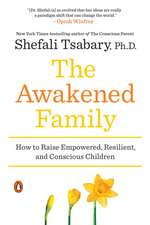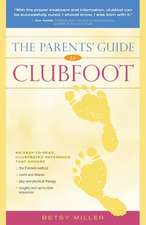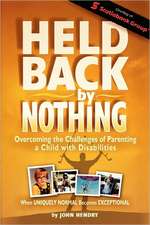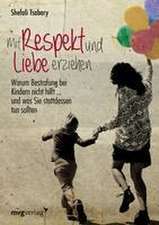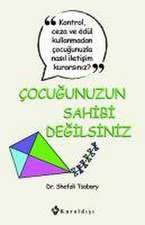Out of Control: Why Disciplining Your Child Doesn't Work and What Will
Autor Shefali Tsabaryen Limba Engleză Paperback – 23 dec 2013
Every parent wants the golden key to raising well-behaved, academically gifted, successful, happy children. Embedded in the collective psyche is the notion that discipline is the cornerstone to achieving these goals. Out of Control offers a never-before-published perspective on why the entire premise of discipline is flawed. Dr. Shefali Tsabary reveals how discipline is a major cause of generations of dysfunction. The author goes to the heart of the problems parents have with children, challenging society’s dependence on discipline, daring readers to let go of fear-based ideologies and replace them with an approach that draws parent and child together. The key is ongoing meaningful connection between parent and child, free from threats, deprivation, punishment, and timeouts — all forms of manipulation. Parents learn how to enter into deep communion with their children, understanding the reasons for a behavior and how to bring out the best in the child. Far from a laissez-faire, anything goes, approach, this is how a child learns responsibility and takes ownership of their life, equipped with character and resilience that flow naturally from within.
Preț: 107.44 lei
Nou
Puncte Express: 161
Preț estimativ în valută:
20.56€ • 21.39$ • 16.97£
20.56€ • 21.39$ • 16.97£
Carte disponibilă
Livrare economică 24 martie-07 aprilie
Preluare comenzi: 021 569.72.76
Specificații
ISBN-13: 9781897238769
ISBN-10: 1897238762
Pagini: 248
Dimensiuni: 150 x 226 x 20 mm
Greutate: 0.39 kg
Editura: Namaste Publishing Inc.
Locul publicării:Canada
ISBN-10: 1897238762
Pagini: 248
Dimensiuni: 150 x 226 x 20 mm
Greutate: 0.39 kg
Editura: Namaste Publishing Inc.
Locul publicării:Canada
Cuprins
1 A World that Majors in Control
2 Why Discipline Doesn’t Work
3 Is It Really for Your Child’s “Own Good”?
4 Let Consequences Do Their Job
5 How Rescuing Our Children Teaches Irresponsibility
6 Rudeness, Biting, and Hitting: How to Make Your Child’s Limits Clear
7 Your Children Are Here to Challenge Your Integrity
8 How to Say “Yes” or “No” Effectively
9 You’re Not a Moviemaker
10 Abandon the Idea of Perfection
11 A Strong Child Lives Here
12 It’s Not about You
13 Learn to Read Your Child’s Cues
14 What It Means to Honor Your Child
15 Is What You Are Asking Fair?
16 How to Stay Sane as Your Child Goes Through Phases
17 Tricking Children Is Tricky Business
18 What to Do When Your Child Shuts You Out
19 The Rule about Rules
20 How to Respond to a Teen Who Rebels
21 Avoid Homework Battles
22 Why Do Children Bully?
23 The Challenge of Sibling Rivalry and Children Who Can’t Get Along with Other Children
24 When You Spare the Rod, You Don’t Spoil Your Child
25 In Defense of Parents
26 How to Be an Effective Parent
27 Let’s Connect
28 W Is for Witness
29 I Is for Inquire
30 N Is for Neutrality
31 N Is for Negotiate
32 E Is for Empathize
33 R Is for Resolve
Afterword
Tips for Staying Sane in the Conflict Zone
2 Why Discipline Doesn’t Work
3 Is It Really for Your Child’s “Own Good”?
4 Let Consequences Do Their Job
5 How Rescuing Our Children Teaches Irresponsibility
6 Rudeness, Biting, and Hitting: How to Make Your Child’s Limits Clear
7 Your Children Are Here to Challenge Your Integrity
8 How to Say “Yes” or “No” Effectively
9 You’re Not a Moviemaker
10 Abandon the Idea of Perfection
11 A Strong Child Lives Here
12 It’s Not about You
13 Learn to Read Your Child’s Cues
14 What It Means to Honor Your Child
15 Is What You Are Asking Fair?
16 How to Stay Sane as Your Child Goes Through Phases
17 Tricking Children Is Tricky Business
18 What to Do When Your Child Shuts You Out
19 The Rule about Rules
20 How to Respond to a Teen Who Rebels
21 Avoid Homework Battles
22 Why Do Children Bully?
23 The Challenge of Sibling Rivalry and Children Who Can’t Get Along with Other Children
24 When You Spare the Rod, You Don’t Spoil Your Child
25 In Defense of Parents
26 How to Be an Effective Parent
27 Let’s Connect
28 W Is for Witness
29 I Is for Inquire
30 N Is for Neutrality
31 N Is for Negotiate
32 E Is for Empathize
33 R Is for Resolve
Afterword
Tips for Staying Sane in the Conflict Zone
Recenzii
The patterns of behavior we witness in childhood become the template for our own way of parenting.
It’s because discipline focuses on behavior, not on the feel- ings driving the behavior, that it undercuts the very thing we are trying to accomplish.
We’ve been so schooled to impose “lessons” on our children that it feels counterintuitive to allow the lesson to emerge naturally out of the situation.
The reality is that children learn not because we tell them, but from how we relate to them. It’s the differ- ence between “doing to” ver- sus “doing with.”
To give a child things or deprive them because to do so matches our subconscious agenda—our unresolved emo- tional baggage—rather than aligning with their develop- mental needs, is to court conflict.
Each moment with our child is a reflection of the past and a foundation for the future.
It’s the dynamic that arises from insisting on our paren- tal agenda that creates the need for discipline.
When it comes to accepting ourselves as imperfect, we set the tone for our children. The degree to which they accept their imperfections tends to be the degree to which we accept and honor our own.
To be present for our children means to be aware of our own subconscious agenda so we don’t impose this on our children.
If a parent puts out the kind of vibes that welcome feel- ings, even when the feelings are difficult to tolerate, the child picks up on this, eventually learning how to manage their feelings in a healthy manner.
There are all kinds of ways we can help our children cope with their world. Creativity is what’s needed, not admonish- ment or discipline.
Our children didn’t come into the world to be our puppets. They came here to struggle, fumble, thrive, and enjoy—a journey for which they need our encouragement.
Notă biografică
Shefali Tsabary, Ph.D., received her doctorate in Clinical Psychology from Columbia University, New York. Dr. Shefali was exposed to Eastern philosophy at an early age and integrates its teachings with Western psychology. This blend of East and West allow her to reach a global audience and establishes her as one of a kind in the field of mindfulness psychology. She lectures extensively on mindful living and conscious parenting around the world and currently has a private psychotherapy practice in New York City. She has a strong following on social media, posts regularly on Huffington Post, and can be seen on uTube and Ted Talk. Her books include It's a Mom: What You Should Know about the Early Years of Motherhood and The Conscious Parent, which has been heavily endorsed by Oprah Winfrey. She lives in New York City.
Textul de pe ultima copertă
Where did the belief come from that we need to discipline our children if they are to grow up into individuals who are well adjusted and who make something of their lives?
Out of Control reveals how the very discipline we impose to control behavior is in reality a major cause of bad behavior, disrespect for adults, and dysfunction such as bullying, hostility toward family and society, drugs, alcoholism, and teen suicide.
Dr Tsabary asserts that to parent effectively requires us to develop a deep connection with our children, so that we address the feelings that drive a child’s behavior instead of punishing. “When we tackle the reason for the behavior,” says Dr Tsabary, “it automatically changes.”
Far from a laissez-faire, “anything goes” approach, Dr Tsabary advocates for a high level of parental resolve that majors not in control, but in helping a child develop a sense of personal responsibility.
Authentic connection, in which children can be real with their parents, leads to a home in which self-discipline prevails— both for the child and the parent.
The need to “impose our will” on our children evaporates, leading to respect, ownership of one’s life, and a strong character marked by a resilience that flows naturally from within.
Descriere
Every parent wants the golden key to raising well-behaved, academically gifted, successful, happy children. Embedded in the collective psyche is the notion that discipline is the cornerstone to achieving these goals. Out of Control offers a never-before-published perspective on why the entire premise of discipline is flawed. Dr. Shefali Tsabary reveals how discipline is a major cause of generations of dysfunction. The author goes to the heart of the problems parents have with children, challenging society’s dependence on discipline, daring readers to let go of fear-based ideologies and replace them with an approach that draws parent and child together. The key is ongoing meaningful connection between parent and child, free from threats, deprivation, punishment, and timeouts — all forms of manipulation. Parents learn how to enter into deep communion with their children, understanding the reasons for a behavior and how to bring out the best in the child. Far from a laissez-faire, anything goes, approach, this is how a child learns responsibility and takes ownership of their life, equipped with character and resilience that flow naturally from within.

